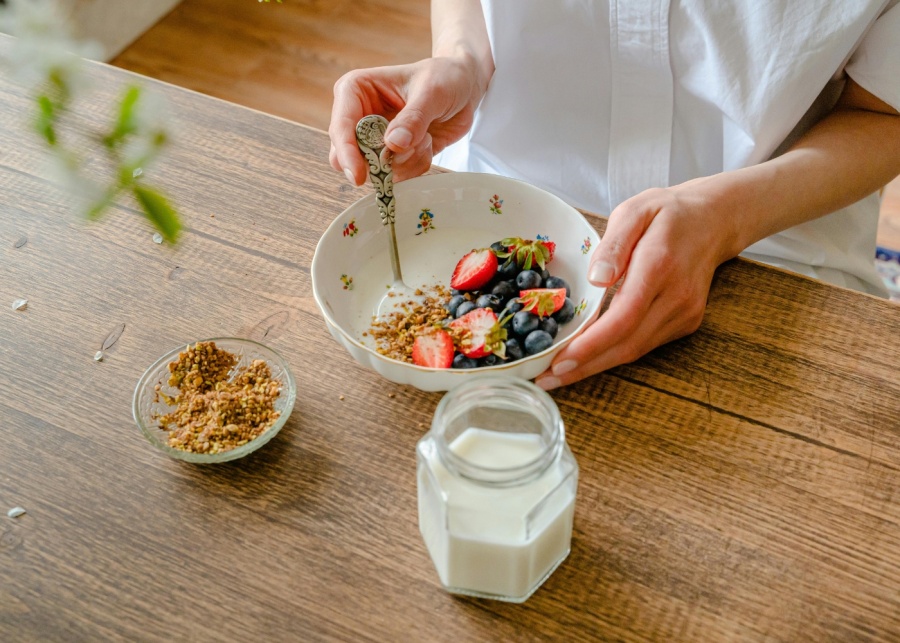The spotlight is on probiotics! We speak to an expert to understand how probiotics work, their benefits and other handy must-knows.
If you’re chronically online (like us), the topic of gut health will sound familiar. It’s a social media buzzword that has the Internet in a chokehold, sparking conversations on how to heal the gut and tackle gastrointestinal conditions like irritable bowel syndrome. Think juice cleanses, fermented foods, and the highly raved about probiotics. Curious about the benefits of probiotics and what they do? You’ve come to the right place.
To understand probiotics from the inside out, we spoke to Dr Lin Cui Li, senior consultant in gastroenterology and hepatology at Mount Elizabeth Hospital, who has 20 years of experience in the field. From how it works to tips on selecting the right probiotic supplements, here’s our 101 guide!
All you need to know about probiotics
What are probiotics?
Probiotics are beneficial live bacteria and yeasts that benefit your body, especially your gut, explains Dr Lin. Our intestines contain trillions of tiny microbes – making up your gut microbiome – that work together with your body to keep you healthy.
A healthy gut maintains a balance between the ‘good’ and ‘bad’ microbes. When this balance gets disrupted, dysbiosis occurs, and harmful microbes can take over. In turn, this can lead to issues like obesity, diabetes, liver disease, depression, autoimmune disorders and cancer. This is where probiotics come in. By introducing more ‘good’ microbes into your system, they restore balance and diversity for a healthier gut.
What are the key benefits of probiotics?
Besides enhancing gut health, consuming probiotics also has other positive effects.

1. Hydration and detoxification
Everyone knows the importance of hydration. Good news: probiotics can be helpful in this aspect. By maintaining a healthy gut lining, probiotics improve your body’s absorption of water and electrolytes.
Hydration aside, probiotics also enhance your body’s natural detoxification systems. Plus, they help to strengthen your gut barrier, preventing harmful toxins from entering the bloodstream.
2. Enhanced performance
Are you a gym rat or an athlete? Research suggests probiotics may enhance athletic performance and recovery. They support the connection between the gut, brain and muscles, which improves how the body handles stress and physical activity.
While athletes are reported to have higher diversity and abundance of ‘good’ gut bacteria, rigorous training can upset this balance. When this happens, probiotics can help restore the balance. Plus point: probiotics decrease fatigue and muscle soreness, while improving endurance and recovery time. A win-win!
3. Regulated sleep
Those in need of sweet slumber can consider probiotics, too. According to Dr Lin, the gut microbiome plays a significant role in regulating sleep through its influence on circadian rhythms and production of sleep-related compounds like melatonin and serotonin.
An imbalanced microbiome can disrupt sleep patterns, while a healthy, diverse gut flora is associated with better sleep quality and duration. Maintaining gut health through diet – and potentially probiotics – can help support restful sleep. We’ll gladly welcome any way to get more precious shut-eye!
Is there an optimal time to consume probiotics?
Yes, the timing of probiotic consumption can impact their effectiveness, says Dr Lin. For probiotics to do their job, they need to survive stomach acid and reach the intestines. She recommends taking probiotics about 30 minutes before a meal or with food (when stomach acid levels are lower) to give them a better chance of survival.
What are some natural sources of probiotics?

Wondering how you can get the goodness of probiotics naturally? Try food and drinks that are rich in probiotics. Fermented foods are one key source of beneficial probiotics. Think yogurt, sauerkraut, kimchi, miso and tempeh. For beverages, look towards kombucha tea, kefir and kvass. Of course, probiotic supplements are a popular alternative as well.
Conversely, stay away from foods that can negatively impact the gut microbiome. Dr Lin shares that highly processed foods (containing artificial additives, excessive sugar and unhealthy fats) can reduce microbial diversity and increase inflammation. Overconsumption of red and processed meats has also been linked to gut-related health issues and cancer.
What are some tips on choosing probiotic supplements?
With an array of probiotic supplements in the market, it can feel overwhelming to find the best pick for you. To ease your decision-making process, here are some factors to consider.
1. Look for research-backed probiotic strains
One tip is to look for products containing clinically studied strains, such as Lactobacillus or Bifidobacterium, that are backed by strong scientific evidence. While it’s commonly thought that multi-strain probiotic formulas are more effective, Dr Lin shares that it isn’t always the case.
Single-strain probiotics can be equally effective when matched to specific needs. It’s more crucial to consider if the strains are research-backed and appropriate for your health goals.
2. Examine how it’s formulated and stored

Another factor is the formulation and storage of the probiotic. This affects whether the probiotic can survive through digestion and reach the gut effectively. Some products use methods like freeze-drying or cold chain storage to protect the bacteria and ensure they remain active. In general, brands backed by scientific research or reputable health organisations are more likely to have products with higher quality and effectiveness.
3. Look at the CFU count
Meet CFU count, a common indicator used to evaluate a probiotic’s effectiveness. For the uninitiated, CFU (aka colony-forming units) refers to the number of bacterial cells in a probiotic supplement.
In general, one billion CFUs is the recommended minimum for probiotic supplements. But, the optimal amount will depend on the specific strains used and an individual’s health, where some health conditions may benefit from higher counts. It is still as important to consider other factors such as quality and strain specificity when choosing probiotic supplements.

Curious about integrating probiotics into your life to see how they boost your health? Bioglan Platinum Probiotics is one viable option in the market. Specially formulated with scientifically proven 50 billion and 100 billion formulations, the brand’s probiotics offer digestive and immune support. Browse its range of high-potency, science-backed probiotic supplements, such as the Probiotics 50 Billion Double Strength 30s from 18 targeted strains. Find out more about Bioglan Platinum Probiotics, or add to cart via Guardian’s online store.
Important notice: This paid advertorial is for general information and should not be considered medical advice. While we strive for accuracy, medical conditions vary, and the treatments mentioned may not suit everyone. Consult a qualified healthcare professional for personalised medical guidance. All expert input is for informational purposes only and does not imply or constitute any product and/or service endorsement.
This post is in partnership with Bioglan.













